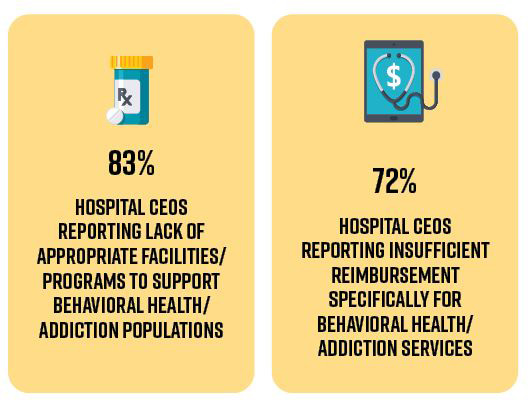In the dynamic world of healthcare, hospital CEOs are tasked with leading their teams through complex challenges that span across operational, financial, and clinical domains. Recent findings from a CEO survey fielded by the American College of Healthcare Executives (ACHE) shed light on these pressing issues, placing workforce challenges, financial constraints, and behavioral health concerns at the forefront. In this blog post, we’ll delve into these critical areas, offering insights into how data analytics serves as a critical tool to help address these concerns, while maintaining a focus on patient care and operational efficiency.
Workforce challenges
The healthcare industry is facing an unprecedented shortage of professionals. With the World Health Organization projecting a shortfall of 10 million health workers by 2030, hospitals are feeling the pressure. The ACHE survey reveals a significant concern among hospital CEOs, with 86% reporting a shortage of registered nurses and 87% noting a shortage of medical technicians.
![]()
These shortages not only strain the existing workforce, but also compromise the quality of patient care. Leveraging data analytics can help in identifying staffing needs, optimizing resource allocation, and reducing staff turnover, thereby ensuring that patient care remains uncompromised.
Financial constraints
The financial health of hospitals has been severely impacted, with the COVID-19 pandemic exacerbating existing challenges. The ACHE survey highlights increasing costs for staff and supplies, alongside reducing operating costs, as primary concerns. Financial challenges, however, are not new, having been a top concern for hospitals for 17 consecutive years.
In this landscape, data analytics can prove effective, offering insights into revenue cycle management, operational efficiencies, and cost-saving opportunities. Through the strategic use of analytics, hospitals can navigate financial challenges more effectively, ensuring the sustainability of their operations.
Behavioral health and addiction
The demand for mental health and addiction services has surged, with 83% of hospital CEOs reporting a lack of appropriate facilities or programs. This challenge is compounded by insufficient funding and reimbursement issues. Data analytics can play a crucial role in enhancing care for these populations by improving care coordination, identifying at-risk individuals, and optimizing resource allocation. By integrating and analyzing data from various sources, hospitals can develop targeted interventions and improve access to care for those in need.

The power of data analytics
The application of data analytics in healthcare offers a path forward in addressing these complex challenges. By harnessing the power of data, hospital CEOs can gain insights that inform strategic decisions, improve operational efficiencies, and enhance patient care. Analytics provide a means to track and understand trends, forecast future needs, and develop evidence-based strategies that tackle the core issues facing hospitals today.
Conclusion
The challenges faced by hospital CEOs are daunting, yet not insurmountable. The key to navigating through these challenges lies in the effective use of data analytics. By embracing analytics, hospitals can transform challenges into opportunities for growth and improvement. The insights gained through analytics not only aid in making informed decisions but also in fostering innovation and enhancing patient care.
As we delve deeper into the potential of data analytics in reshaping healthcare, we invite you to explore the full extent of its capabilities and benefits. For a more comprehensive understanding of how analytics can address the pressing challenges faced by hospital CEOs, we encourage you to read our complete white paper on this topic. Discover how data-driven strategies can revolutionize healthcare operations, financial management, and patient care, paving the way for a more resilient and efficient healthcare system.
- Navigating the Future: Trends in Wine Tasting Rooms - July 16, 2024
- Why You’ll Want to Attend DIUC24 - June 20, 2024
- The Role of Technology in Solving Nursing Challenges - May 6, 2024




